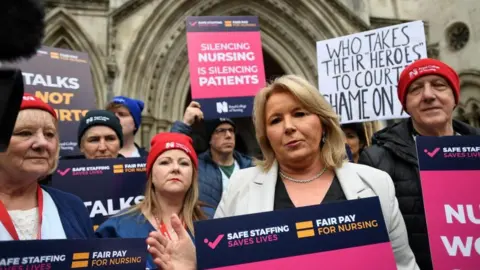Nurses' strike in England to be cut short after court ruling
 EPA
EPAA 48-hour strike by nurses in England over the Bank Holiday weekend will be cut short by a day after a High Court judge ruled it was partly unlawful.
The walkout in a row over pay by the Royal College of Nursing, due to start on Sunday, will now end on Monday.
RCN chief Pat Cullen said this was "the darkest day" of the dispute so far and the government needed to negotiate.
Downing Street said it was "regrettable" the government had to go to court and it had tried to avoid it.
The judge ruled the RCN's six-month mandate for strike action would have lapsed by Tuesday.
Health Secretary Steve Barclay took legal action after NHS Employers said the last day of the planned strike was not covered by the mandate as the ballots closed on 2 November at midday.
The judge Mr Justice Linden ordered the RCN to pay the costs of the hearing, saying the union had showed "a high degree of unreasonableness", the outcome was "inevitable" and "instead of grasping the nettle and conceding" it had forced the case to court.
After the hearing, the RCN's general secretary Ms Cullen said: "They [the government] have won their legal battle today. But what this has led to is they have lost nursing and they've lost the public.
"They've taken the most trusted profession through the courts, by the least trusted people."
She levelled her criticism at Mr Barclay and the government for clapping for nurses only to leave the NHS to "crumble" and said they should be negotiating with nurses rather than taking them to court.
She said it was with a "heavy heart" that strike action could continue in the lead-up to Christmas, adding: "If Steve Barclay continues to stay in the tunnel that he's in, we will end up with strike action for the next six months because nursing staff are not going to step back now."
Mr Barclay said: "I firmly support the right to take industrial action within the law - but the government could not stand by and let plainly unlawful strike action go ahead.
"Both the NHS and my team tried to resolve this without resorting to legal action."
'Patients at risk'
The strike was called earlier this month after RCN members rejected a government offer for England of a 5% pay rise for 2023-24 and a one-off payment of at least £1,655 to top up last year's salary, depending on staff grade.
The union announced its members had rejected the offer by 54% to 46%.
The walkout will involve NHS nurses in emergency departments, intensive care, cancer wards and other wards.
Nurses have already walked out twice this year - on 6 and 7 February and on 18 and 19 January - but on those dates there were exemptions, so nursing cover was maintained in critical areas.
The government has said strike action with no national exemptions would put patients at risk.
The RCN has said it would ballot members for further strike action once its current mandate expires.
Other unions are also consulting members on the pay deal, which is being offered to all NHS staff, other than doctors and very senior managers.
Shortly after the High Court judgement the Chartered Society of Physiotherapy announced its members had accepted the deal by 65% to 35%.
The biggest health union, Unison, has also backed the deal, as has the midwives' union.
But the union representing radiographers has rejected along with the Royal College of Podiatry.
All the health unions will meet with ministers on Tuesday to reveal whether a majority of staff back the Agenda for Change pay deal.
It is expected that the GMB - one of the biggest unions involved - will announce on Friday that its membership has accepted the government's pay offer.
It would mean that when the GMB meets the other health unions to vote on the pay offer, a majority are almost certain to back it.
